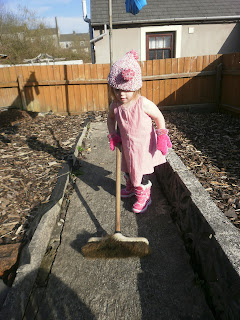There’s a certain irony that the summer’s big blockbuster book seems to share its name with the way most of this summer has turned out, isn't there? I’ve seen at least 50 shades of grey clouds of late. I know the sunshine has finally made a very welcome appearance, but until the last couple of days, I thought we'd skipped straight through to November. I meant to post this last week while the weather was still all miserable, but I've been busy, so here you go now.
 I saw something recently about 50 Shades of Grey, suggesting that because seemingly the entire female population of the country is engrossed in reading a rather mucky book and, well, getting a bit jiggy, there’s going to be a baby boom in about 8 months time. Hmmm. The entire female population except me, obviously. I honestly have no interest in reading about someone else’s made up sex life, I read the first couple of chapters as a free download, and I prefer my reading matter to be a bit better written. If you want to read it, that's your choice, but I've never been one for over-hyped bandwagons - I still haven't read Harry Potter for the exact same reason.
I saw something recently about 50 Shades of Grey, suggesting that because seemingly the entire female population of the country is engrossed in reading a rather mucky book and, well, getting a bit jiggy, there’s going to be a baby boom in about 8 months time. Hmmm. The entire female population except me, obviously. I honestly have no interest in reading about someone else’s made up sex life, I read the first couple of chapters as a free download, and I prefer my reading matter to be a bit better written. If you want to read it, that's your choice, but I've never been one for over-hyped bandwagons - I still haven't read Harry Potter for the exact same reason.
Anyways, I then spotted something else while I was randomly clicking around the outer regions of the internet, saying that a deficiency in vitamin D can affect men's sperm counts, and as we all know, vitamin D is the sunshine vitamin, made by our bodies on exposure to the sun, something there's been a lack of this summer thanks to the 50 shades of grey clouds. So, is there going to be a baby boom or not then? Maybe mother nature is just making sure that even if the women of the UK are getting a bit frisky, there’s no real risk of a population explosion because the blokes are all shooting blanks due to the weather!
Well, I can't do much about your fella's little fella, I'm afraid. Tell him to pop to the shops & buy some supplements if you're worried that all your jiggy might go to waste. But there's a more serious side to all this cloud. The months of April - October are the only time in the UK that our bodies have chance to make vitamin D, which we store up for the rest of the year. In adults, that's one thing, but in children, with their growing bodies, it can present a major health risk.
Leanne Olivier, nutritionist and spokesperson for growingupmilkinfo.com, comments: “Vitamin D is known as the sunshine vitamin. The cloud cover on rainy days has an obvious effect on sunlight, making the sky dark and grey; however, what are less obvious are the knock-on effects of a miserable summer’s days on our toddlers’ health.
“It doesn’t just mean less time playing outdoors; this reduction in exposure to sunlight can be really significant - especially between the ages of one and three years, when toddlers experience a huge period of growth and development and need essential nutrients to support this.”
With the poor weather we’ve been experiencing, it’s more important than ever that toddlers get enough vitamin D from their daily diet.
British children’s vitamin D-poor diets1, combined with low uptake of supplementation, a lack of knowledge amongst parents about their specific nutritional needs, plus a typically British summer, mean toddlers could really be missing out. All toddlers are considered to be vulnerable to low vitamin D in the diet while those who rarely play outside, don’t eat oily fish, don’t take supplements, or who have darker skins2 or cover up for cultural reasons are thought to be particularly at risk.
In the absence of summer sun, nutritionist Leanne recommends a simple combined approach parents can take to ensure toddlers are meeting their vitamin D needs:
· Take a daily children’s supplement of vitamins A, C and D
· Give two 150ml beakers of Growing Up Milk daily providing about 70 per cent of a toddler's daily recommended nutrient intake of vitamin D
· Include food sources of vitamin D in the diet: oily fish once a week and fortified margarines and breakfast cereals, egg and liver!
· Enjoying the summer (April-Oct) sun safely, while taking care not to burn, can provide the benefits of vitamin D
Statistical information in this post comes from the Toddler Census, a survey of over 1000 mothers carried out in July 2011.
References:
1. Bates B et al. National Diet and Nutrition Survey 2008/09-2009/10
2 Advisory Committee on Nutrition. Update on Vitamin D. Position statement by the Scientific Advisory Committee on Nutrition. London. TSO, 2007











